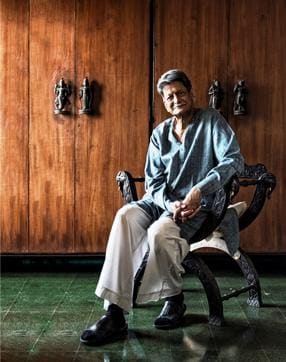Kanhaiyya speaks of azadi, but ignores ultimate azadi: Kiran Nagarkar
Author, playwright Kiran Nagarkar says the youth is forgetting the freedom struggle. Slams Mumbai for being largely “indifferent” towards events that affect the rest of India
Author, playwright Kiran Nagarkar says the youth is forgetting the freedom struggle. Slams Mumbai for being largely “indifferent” towards events that affect the rest of India

Speaking about the events at JNU (Jawaharlal Nehru University), Delhi, noted author, playwright Kiran Nagarkar said, “As a democracy, we have forgotten our national narrative: the freedom struggle. The youth today speaks as if our country lacks history altogether. Take Kanhaiya Kumar, for instance. He spoke of azadi (freedom) in his recent speech at JNU. But he wouldn’t have been able to give his speech had it not been for the ultimate azadi that the likes of Mahatma Gandhi fought for.”
Born in 1942, Nagarkar witnessed the Independence movement and the Partition first-hand. The influence still shapes his outlook toward the current political scenario.
He blamed the superficial nature of social media for the same, especially the short lifespans of ‘trending’ topics and their dangerously growing importance.
He also slammed Mumbai for being largely indifferent to the political issues affecting other parts of India: “Since 1991, post the economic liberalisation, Mumbai has been materialistic and indifferent to the rest of the country.”
“Catatonic changes are happening around us: political and climatic. I want young people to take responsibility for everything that’s wrong with our society and devise holistic strategies to ensure social inclusion, equality and justice,” he said.
The banned play
The drive to change Mumbai’s outlook is evident in Nagarkar’s literary works as well. The introduction to his play Bedtime Story (1977) reads: “There is no crime greater than apathy or indifference”. The play, inspired by the Mahabharata, faced political opposition by the Shiv Sena in Mumbai, and released 17 years after it was first written in 1995.
Nagarkar’s play is a critique on the Indian society for its casteist and sexist outlook. For instance, his tribal prince Eklavya, Dronacharya’s snubbed student, does not sacrifice his thumb. Instead, he creates a mock thumb using soil and spit, and gives it to Dronacharya on a leaf. “Like guru. Like gift,” says Ekalavya in Nagarkar’s book.
FULL INTERVIEW WITH KIRAN NAGARKAR: “We’ve handed Mumbai over to real estate moguls”





